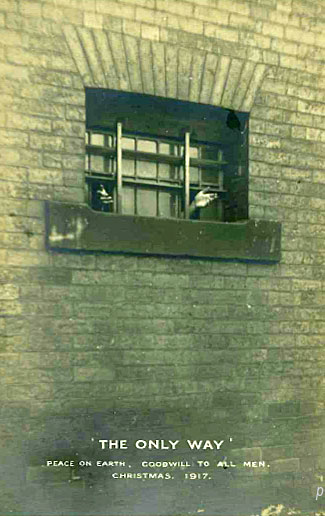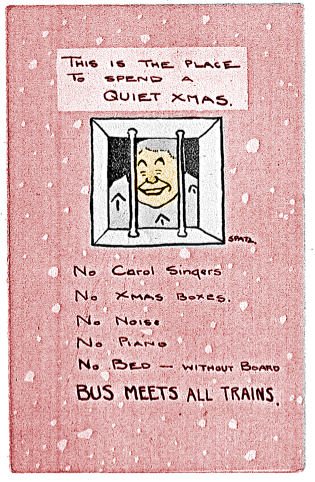
| HOME | TRIBUNAL HOME |
December 1918
November’s big question - What happens now? - still hanging over the NCF unanswered, December was set to carry on the post war theme. Set to continue campaigning for the immediate release of Conscientious Objectors still incarcerated as political prisoners, the focus of the NCF soon shifted, as the intensifying influenza epidemic took its toll on COs around the country. As 1918 would be the last December a significant number of men would be in prison, this review won’t concentrate entirely on the increasing number of COs giving their lives for the cause. Though December 1918 would be a month of death, its also one of Christmas.
5th December - The Future
But first to current affairs. “The Future” covers the NCF’s political position, both as a reaction to a recent speech by Winston Churchill that raised the possibility of permanent conscription in Britain, and as a declaration of what 1919 would see the NCF focus on. The rhetorical question posed by the article - “Why do you worry about Conscription? Of course it will be abolished when Peace is signed” was pertinent - and continues to be so today.
Conscription was not set to disappear immediately after the armistice. Churchill’s speech had not simply left the question open - that “what we [Britain] must do depends on what other nations do”, but had reflected on a continuing role for a large standing army of conscripts which would “maintain order in Russia, Siberia, Germany, Austria, Turkey, the Balkans, Persia and Mexico”. It’s worth noting the order in which these possible future commitments are named, with Churchill immediately focusing on his personal desire to crush the Russian Revolution, coming before any need to police the defeated nations, or the extension of British Imperial interests in Mesopotamia.
There was no indication of a political movement towards the immediate abolition of conscription. Britain had a large standing army, for the moment, and the question of what to do with it seemed to raise awful possibilities in the eyes of politicians. The NCF supported the only major party that promised an end to conscription, and printed the Labour Party Manifesto promise on the subject, that:
“Every wartime restriction on personal and civil liberties must be swept away, and with them must go the greatest instrument of Tyranny, the Military Service Acts, and every form of conscription, industrial as well as military. Moreover, this country must not be behind others in the restoration of civil liberties. There must be an immediate amnesty for all political prisoners”
The NCF and Labour Party were united in their pursuit of these aims throughout 1919, and the unofficial partnership between the two would grow closer and closer from January onwards.
5th, 12th and 19th December - CO Deaths
Though it is sadly now impossible to report in-depth on every single CO death, December 1918 marks the largest amount of lives lost in the CO movement to date. The influenza epidemic was decimating Europe, and Conscientious Objectors were no exception. Weak, malnourished and already ill from the harsh privations and conditions of prison and Home Office Camps, the Tribunal published obituaries and death notices every week.
The camp worst hit by influenza was the Red Roses Home Office Centre in Carmarthenshire, Wales. A combination of neglect, brutal treatment and callous indifference to the condition of critically ill COs would see many at the camp die between November and January 1919. For once, it seemed that the Tribunal staff were speechless in the face of reports from the camp:
“It is one of the worst cases of Home Office callousness and neglect that have come before us, and our readers know the list is a long one. No words can express our indignation at the way these men were treated. The picture of our comrade Peddieson, heroically struggling to nurse the rest, his requests to the agent for help, met only by insults, until at the last, worn out, he was stricken down and died, is one we are not likely to forget.”
Taking our lead from the Tribunal, the full report from Red Roses Camp is presented here.
COs that Died in December 1918
James Alexander
Peter Allen
Tom Allen
Harold Brightman
Lawrence Deller
Alexander Peddieson
William Swettenham
Garth Whinnerah
12th and 19th December - A not-so-merry CO Christmas
With conditions steadily worsening both inside and outside of prisons for Conscientious Objectors around the country, and no end to their imprisonment or conscription in sight, the NCF acted to keep up morale as best it could. Christmas was a critical time. Absolutists in prison, some for the third year in a row, would have received news of the armistice happily, but that would have been followed with the realisation that long stretches inside were ahead, and release would come only when - if ever - conscription was abolished. Contact with the outside world, and the knowledge that there were still people outside the prison campaigning ceaselessly for their release would have been vastly important - and the NCF took up organised singing as both a form of anti-war resistance and a vital morale-booster. Adverts run in every December issue of the Tribunal call for “Singers wanted” to contact Kitty Read “AT ONCE”. Impromptu concerts held outside Pentonville, Wandsworth and Wormwood Scrubs on Christmas Eve and Day, showed an invaluable support for the men inside those prisons.
The Tribunal also mentions the NCF Christmas card for 1918, specially drawn by a “CO artist” containing a message from Bertrand Russel. At the moment, the Christmas 1918 card is missing, but cards from other years, and produced inside Dartmoor Home Office Centre can be seen in this article. The cards were fundraisers, messages of support and an act of solidarity, showing the NCF at it’s hopeful (and slightly antagonistic) best.
Clink on images to enlarge

